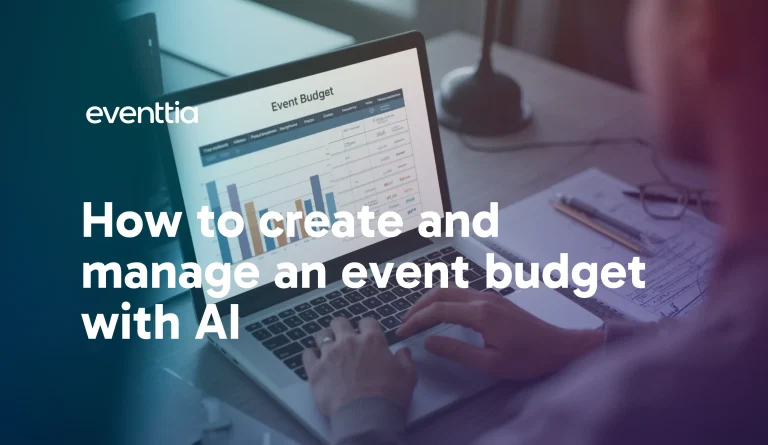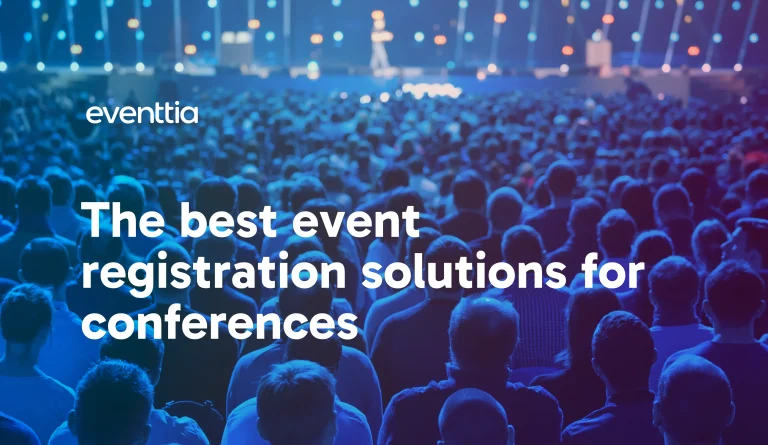Planning successful events always starts with one thing: a well-structured budget. In fact, 78% of event planners say budget constraints are the biggest challenge they face.
Whether you’re organizing a small networking session or a large-scale international conference, your budget determines what’s possible, where to allocate resources, and how to achieve your goals efficiently. But traditional budgeting can be tedious, time-consuming, and prone to errors. Although it’s early days, AI (Artificial Intelligence) is beginning to shape the way we plan, allocate, and optimize resources for events.
In this guide, we’ll cover everything you need to know about how to create and manage an event budget with AI, from the importance of budgeting and the common challenges to practical workflows, AI tools, and expert tips you can start using today.
Quick overview
AI is transforming how event planners create and manage budgets. Replacing manual spreadsheets with intelligent forecasting, automation, and real-time insights. A well-planned budget remains the foundation of every successful event, but AI makes the process faster, smarter, and more accurate.
By integrating tools like Eventtia with AI-powered analytics, planners can automatically track ticket sales and therefore optimize ROI across every event stage.
In this guide, you’ll learn:
- Why structured budgets are critical for event success
- The most common challenges planners face
- How AI simplifies and improves every step of budgeting
- Practical prompts and workflows to create dynamic event budgets
- The best AI tools to use for forecasting, tracking, and reporting
Why budgets are essential for events
Without a clear financial roadmap for your event, it’s easy to overspend, underestimate costs, or run into unpleasant surprises mid-way through planning. A good event budget helps you:
- Define your financial limits: Know exactly what you can spend and where
- Prioritize resources: Allocate funds to the areas that matter most, such as venue, speakers, or technology
- Measure ROI: Track spending against outcomes like ticket sales or sponsorship revenue
- Avoid surprises: Stay prepared for hidden costs and contingencies
- Justify decisions: Use clear financial data to support stakeholder approvals or sponsor negotiations.
The challenges that come with event budgeting
Even the most experienced planners face challenges when managing complex budgets. Common pain points include:
- Manual data entry: Keeping track of hundreds of line items in Excel can lead to inconsistencies, missed entries, or miscalculations.
- Unexpected expenses: As the event evolves, additional expenses often arise (e.g., extra catering, AV upgrades). Without dynamic tracking, these changes can push you over budget.
- Vendor coordination: Different suppliers, currencies, and payment schedules can make reconciliation a nightmare.
- Lack of visibility: When budgets are managed across multiple tools or teams, it’s hard to get a clear, real-time picture of your financial status.
- Poor forecasting: Relying on last year’s data or guesswork makes it difficult to plan accurately, especially when costs fluctuate or event formats change.
The benefits of using AI for budgeting
AI is changing the way event planners approach financial management. Instead of manually inputting, calculating, and predicting, AI does the heavy lifting, saving you time and improving the accuracy of your event budgets. Here’s how AI enhances event budgeting:
- Smart forecasting: AI analyzes historical data (like past event budgets, vendor costs, or attendance) to predict expenses and revenue more accurately.
- Automated categorization: AI can automatically sort and label expenses into categories such as “Venue,” “Food & Beverage,” or “Marketing,” ensuring your reports stay clean and consistent.
- Real-time tracking: AI integrates with accounting and event management systems (like Eventtia) to track spending in real-time and flag budget overruns before they happen.
- Predictive insights: AI can warn you when costs are trending above average or suggest reallocations to optimize ROI.
- Natural language budget queries: Instead of manually filtering data, you can ask an AI assistant “How much have we spent on AV compared to last year?” or “What’s our current food and beverage spend versus the allocated budget?”
How to create an event budget using AI
Creating an event budget used to mean hours spent building spreadsheets, collecting vendor quotes, and manually adjusting numbers every time something changed. AI now streamlines that entire process using intelligent automation, predictive modeling, and natural language interfaces that work with your existing event management tools.
Here’s a step-by-step guide on how to create an event budget using AI.
Step 1: Define your event goals and scope
Before you let AI crunch the numbers, it needs a framework to work within. Firstly, clarify your event’s objectives. What’s the purpose of the event? Lead generation, brand awareness, education, fundraising? Your goals influence where money should be allocated (e.g., production quality for a brand event, speaker fees for an educational conference).
Next, identify key event parameters:
- Event type (conference, gala, festival, hybrid, etc.)
- Location and expected attendance
- Duration and complexity (one-day vs. multi-track, multi-day)
- Target experience level (basic, premium, luxury)
Then, determine your overall budget cap, whether it’s a fixed figure or a range. Once those parameters are clear, AI can instantly generate a structured outline based on best practices and benchmarks.
Prompt example:
“Create a preliminary event budget structure for a 300-person hybrid tech conference in New York City with a $120,000 budget. Include allocations for venue, AV, catering, marketing, and staffing.”
AI tools like ChatGPT can interpret this prompt and return an initial category-level breakdown, saving you hours of manual setup.
Pro tip: Download and use the Event Registration Canvas by Eventtia, to define and monitor your event goals.
Step 2: Use AI to generate budget categories and line items
After defining your parameters, the next step is to build a full financial structure. A well-organized event budget typically includes 8–12 top-level categories (e.g., Venue, Food & Beverage, and Marketing) and dozens of detailed line items under each.
Prompt example:
“List all potential expense categories and line items for a two-day corporate conference with a keynote stage, breakout rooms, hybrid streaming, and a closing dinner.”
An AI budgeting assistant can return a detailed breakdown like this:
Category | Example line items |
Venue | Rental fees, permits, insurance, décor, furniture |
Food and beverage | Catering, service staff, alcohol permit, water stations |
AV and production | Microphones, lighting, stage design, streaming tech |
Marketing | Paid ads, influencer partnerships, email design, printing |
Staffing | Registration team, on-site coordinator, security |
Travel and lodging | Speaker flights, hotel blocks, and shuttle services |
Swag and branding | Badges, lanyards, giveaways, signage |
Contingency | 5–10% reserved for unplanned expenses |
Step 3: Import or connect historical data
The accuracy of any AI-generated budget improves significantly with data context. Feeding the system with your historical event data, or even average market costs, helps the model create realistic estimates. You can provide data context by:
- Uploading past event budgets, invoices, or expense reports
- Connecting your vendor management or accounting software to the AI platform
- Using Eventtia’s historical analytics dashboard to benchmark similar events
Prompt example:
“Analyze the uploaded 2024 event budget and generate a 2025 version adjusted for 6% inflation and an expected 15% increase in attendee count.”
AI will use your previous numbers to forecast a more precise starting point for each category.
Step 4: Let AI recommend cost estimates
Once your categories are defined, AI can recommend baseline costs and proportionate allocations. Many tools reference public pricing data, industry benchmarks, and location-based trends to produce realistic ranges.
Prompt example:
“Estimate venue, catering, and AV costs for a 250-person event in Austin, Texas, with mid-range service providers and a one-day program.”
AI may return:
- Venue: $15,000–$18,000
- Catering: $35–$45 per attendee ($8,750–$11,250)
- AV/Production: $12,000–$15,000
It can also suggest recommended splits. For example, 30% of budget to food and beverage, 25% to venue, and 20% to marketing, based on event type and goals.
Step 5: Build dynamic budget scenarios
Budgeting is rarely a one-and-done process. Event organizers often need to test different “what if” scenarios, such as adding another breakout room, upgrading catering, or securing an extra sponsor. AI can instantly simulate the impact of these changes across the entire budget.
Prompt example:
“Generate three budget scenarios for a fundraising gala: conservative ($75,000), standard ($100,000), and premium ($130,000), adjusting décor, catering, and entertainment accordingly.”
AI will build three versions of your budget with corresponding line-item adjustments. This allows you to compare options visually, side by side.
Step 6: Set up AI-driven alerts and automations
Once your initial budget is built, AI can help you stay proactive by tracking spending and sending alerts automatically. Here’s how to set it up:
- Define spending thresholds per category (e.g., Catering = 90% cap)
- Connect your payment or accounting software
- Enable notifications for anomalies or overspending
Prompt example:
“Notify me when total marketing spend exceeds 85% of its budget or when any vendor invoice is overdue by more than 7 days.”
Step 7: Export, review, and refine with stakeholders
The final step is collaboration. AI gives you an intelligent starting point, but stakeholder review ensures the budget aligns with brand priorities, sponsor expectations, and logistical realities. Use your AI-generated budget to:
- Create polished summaries or visual dashboards for presentations.
- Model ROI and break-even points automatically.
- Simulate cost adjustments based on feedback
Prompt example:
“Summarize this event budget into a visual report with category-level spend, estimated ROI, and top three areas of savings opportunity.”
Eventtia’s built-in reporting tools let you share real-time budget dashboards with internal teams or sponsors without the need for manual spreadsheet updates.
How to use AI to manage your event budget
Once your budget is set, AI can help you track, adjust, and report in real-time. Here’s how to make the most of it:
- Real-time monitoring: AI tools integrated with your payment or event management platform can track expenses automatically as invoices are entered.
- Predictive alerts and recommendations: AI can identify anomalies, like when catering costs are trending 15% higher than expected, and alert you before you exceed your limits. Try using a prompt like “Alert me if any budget category exceeds 80% of its allocation before the event date.”
- Revenue optimization: AI tools can analyze ticket sales, sponsorship performance, or exhibitor fees to forecast total revenue and adjust spending dynamically.
- Automated reporting: AI can automatically compile expense summaries, compare actuals vs. planned, and create visual dashboards for stakeholders. Use a prompt like “Generate a post-event financial report comparing budget vs. actual spend and highlight the top three areas of overspend.”
The best AI tools for creating and managing event budgets
Here are some top AI-powered tools that make event budgeting easier, smarter, and faster:
Tool | Best for | Key features | How to use it for event budgeting |
ChatGPT / Copilot | AI-powered budget generation and idea expansion | Prompt-based budget templates, cost estimation, and categorization | Use prompts to create initial budget outlines and generate scenarios or vendor negotiation scripts. |
ClickUp AI | Project management and budgeting | Smart task cost estimation, expense tracking | Create project budgets linked to specific event milestones. |
Notion AI | Document and data organization | Smart budget templates and summaries | Generate detailed budget frameworks or use formulas for dynamic cost tracking. |
Forecast.app | Predictive analytics | Machine learning for cost forecasting | Analyze historical event budgets to predict future costs and ROI. |
QuickBooks + AI Insights | Financial reporting | Real-time financial tracking and anomaly detection | Integrate invoices and payments for seamless reconciliation. |
We recommend combining Eventtia’s event data (including registrations, sponsorship revenue, and vendor payments) with AI financial analysis tools for a fully automated budget management workflow.
A note on data and human insight
AI makes event budgeting faster and easier, but it still needs good data and human judgment. The best results happen when planners check the numbers AI suggests, keep past budgets and costs updated, and use their own experience to make final decisions. Think of AI as a smart helper – it supports you, but you’re still in charge.
Key takeaways: Eventtia + AI = Smarter, more effective event budgeting
AI is transforming the event industry, and budgeting is one of the areas seeing the biggest improvement. By using AI, event planners can create detailed budgets in minutes, forecast expenses and revenue more accurately, and make faster, data-driven financial decisions. AI also helps organizers adjust to real-time changes, spot overspending early, and generate clear reports for stakeholders.
Eventtia helps planners connect all their event data, such as registrations, ticket sales, sponsorship revenue, and vendor information, in one place. When paired with AI-powered analytics, this data turns into valuable insights that help you plan, monitor, and optimize your budgets across every event.
Ready to see how AI can transform your event budgeting? Schedule a demo today and start creating smarter budgets that power better events.
Frequently asked questions: How to create and manage an event budget with AI
Can AI really create an accurate event budget?
Yes. AI uses past data, cost benchmarks, and current market trends to generate realistic, data-backed estimates. However, human oversight is still essential for final validation.
Do I need technical skills to use AI budgeting tools?
Not at all. Most AI tools (and event management platforms like Eventtia) feature user-friendly interfaces and guided prompts designed for non-technical event planners.
Can AI help manage multiple event budgets simultaneously?
Absolutely. With AI integrations, you can track budgets across multiple events, compare financial performance, and consolidate reporting, which is perfect for agencies or organizations running annual event portfolios.
What’s the best way to combine AI and human expertise?
Use AI for automation, prediction, and data analysis, and rely on human insight for strategy, negotiation, and creative problem-solving.
Discover how Eventtia helps world-leading brands digitize and scale their events
Learn moreShare




